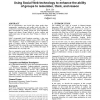Free Online Productivity Tools
i2Speak
i2Symbol
i2OCR
iTex2Img
iWeb2Print
iWeb2Shot
i2Type
iPdf2Split
iPdf2Merge
i2Bopomofo
i2Arabic
i2Style
i2Image
i2PDF
iLatex2Rtf
Sci2ools
119
click to vote
SIGMOD
2009
ACM
2009
ACM
Augmented social cognition: using social web technology to enhance the ability of groups to remember, think, and reason
We are experiencing a new Social Web, where people share, communicate, commiserate, and conflict with each other. As evidenced by systems like Wikipedia, twitter, and delicious.com, these environments are turning people into social information foragers and sharers. Groups interact to resolve conflicts and jointly make sense of topic areas from "Obama vs. Clinton" to "Islam." PARC's Augmented Social Cognition researchers -- who come from cognitive psychology, computer science, HCI, CSCW, and other disciplines -- focus on understanding how to "enhance a group of people's ability to remember, think, and reason". Through Social Web systems like social bookmarking sites, blogs, Wikis, and more, we can finally study, in detail, these types of enhancements on a very large scale. Here we summarize recent work and early findings such as: (1) how conflict and coordination have played out in Wikipedia, and how social transparency might affect reader trust;...
Database | SIGMOD 2009 | Social Cognition Researchers | Social Information Foragers | Social Tagging Systems |
| Added | 05 Dec 2009 |
| Updated | 05 Dec 2009 |
| Type | Conference |
| Year | 2009 |
| Where | SIGMOD |
| Authors | Ed H. Chi |
Comments (0)

